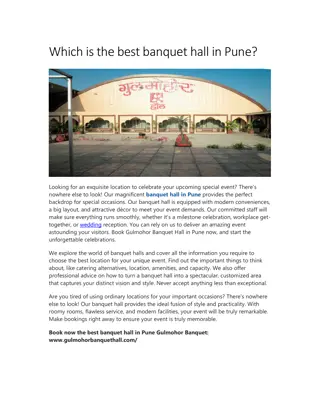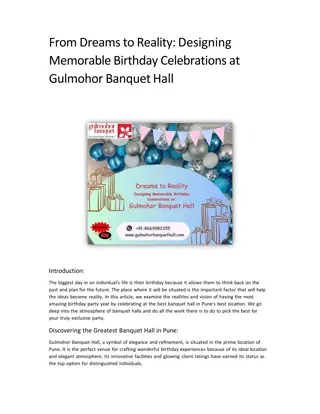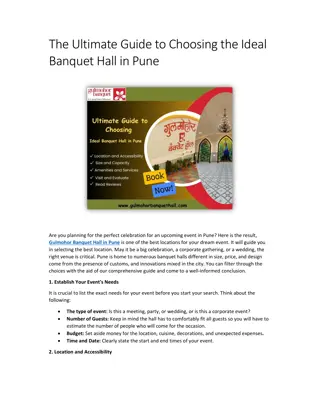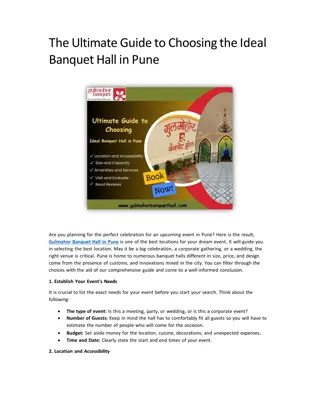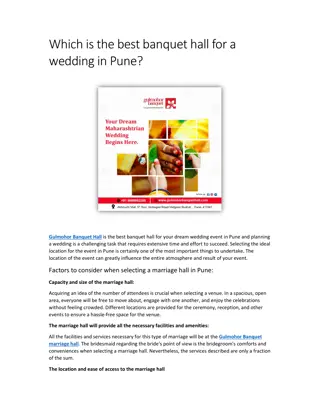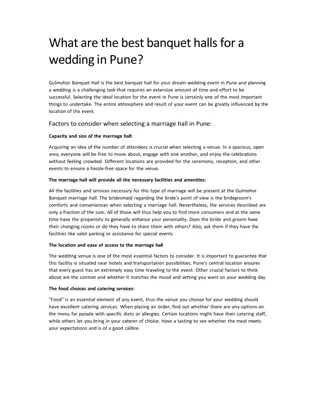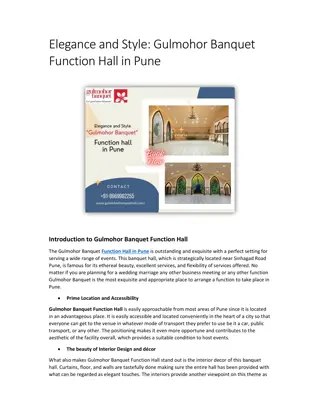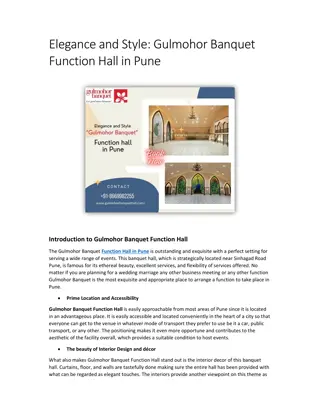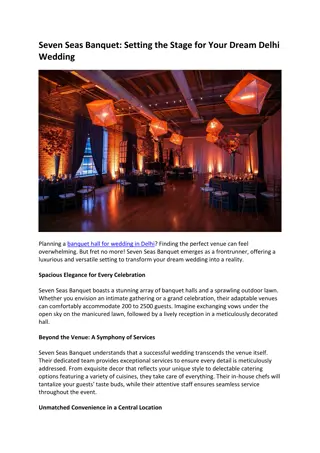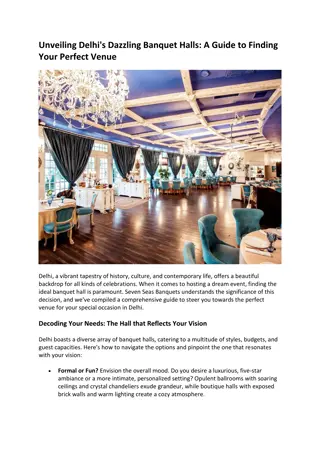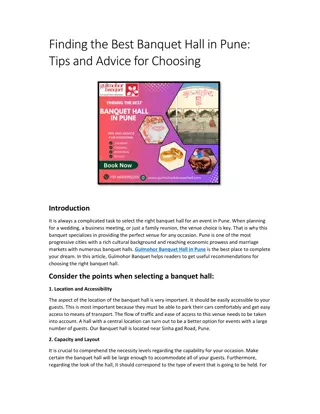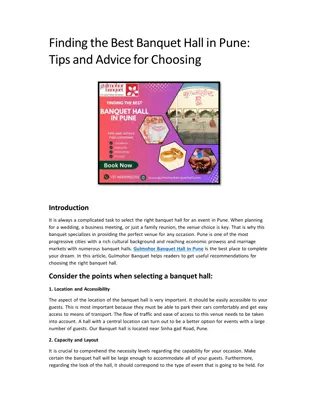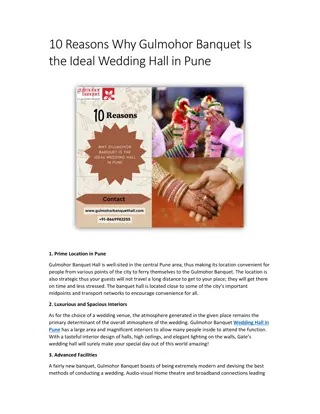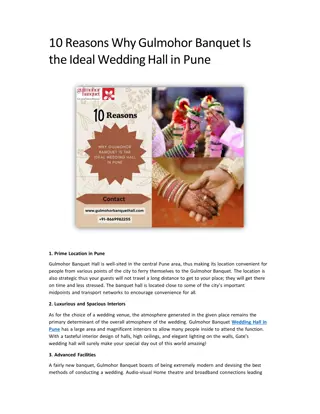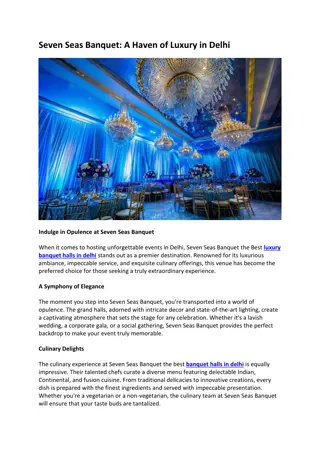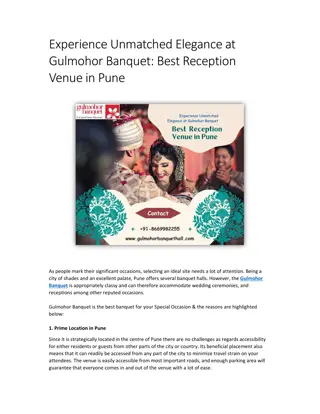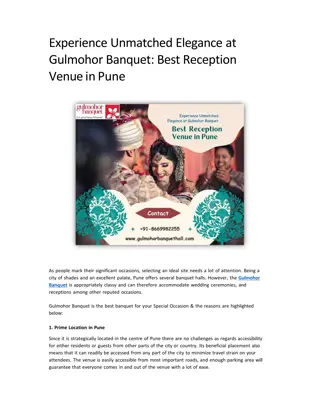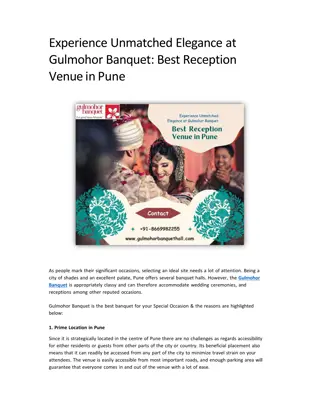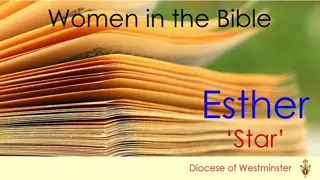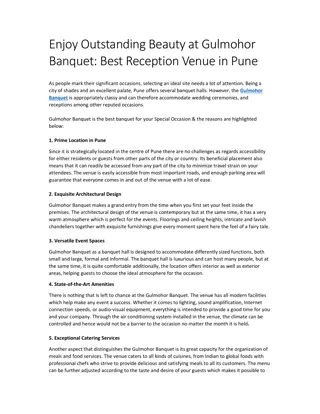Esther: The Banquet and Esther's Courageous Act
Queen Esther, with courage and wisdom, prepares to approach King Ahasuerus to save her people from impending danger. As she dons her royal attire and stands before the king, her actions signify a pivotal moment in the narrative. Meanwhile, poignant prayers and reflections on faith and strength are interwoven with the unfolding events, emphasizing the themes of bravery and determination in the face of trials.
Download Presentation

Please find below an Image/Link to download the presentation.
The content on the website is provided AS IS for your information and personal use only. It may not be sold, licensed, or shared on other websites without obtaining consent from the author.If you encounter any issues during the download, it is possible that the publisher has removed the file from their server.
You are allowed to download the files provided on this website for personal or commercial use, subject to the condition that they are used lawfully. All files are the property of their respective owners.
The content on the website is provided AS IS for your information and personal use only. It may not be sold, licensed, or shared on other websites without obtaining consent from the author.
E N D
Presentation Transcript
Esther 5:1-8 The Banquet
Opening Prayer Almighty God, whose blessed Son was led by the Spirit to be tempted by Satan: Come quickly to help us who are assaulted by many temptations; and, as you know the weaknesses of each of us, let each one find you mighty to save; through Jesus Christ your Son our Lord, who lives and reigns with you and the Holy Spirit, one God, now and for ever. Amen. (BCP) Have compassion on us and on all Israel our brethren. Irradiate us with the great light of Your face, the face of the Living King, the King of Life. Give us long life, good life, rectified life. Fill our hands with Your blessings, from the great wealth of Your hands. Spread the succah of Your shalom over us. Rectify us with good council. Bless us and all Israel with shalom, goodness, blessing, grace, love, mercy. Bless us all, our Father, as one, in the light of Your face (A Portion of the Prayer for Before the Purim Feast.) 2 9/23/2024 Esther 5:1-8
Review from Last Week A reluctant and rightly scared Queen has been convinced by her older and wiser cousin to act in the protection of the Jewish people. Mordecai resorts to public lamentation in the voicing of his complaints and this binds the Queen to react. His arguments are strong: 1. Do not believe the walls of the Castle will protect you from the danger ahead. All Jews have been sentenced to death and you are a Jew. 2. If you refuse to act, the protection of the Jewish people will rise from a different corner, but you and I will be dead. 3. Perhaps it was for a time such as this that you came into power. After agreeing to become involved the Queen orders a fast around the empire and resolves to speak to the King, even if this leads to her death. 3 9/23/2024 Esther 5:1-8
5:1 On the third day Esther put on her royal robes and stood in the inner court of the kings palace, opposite the king s hall. The king was sitting on his royal throne inside the palace opposite the entrance to the palace. We Need it Every Hour by Sara A. Underwood (1838-1911) We need it every hour A purpose high, To give us strength and power To do or die. We need it every hour A firm, brave will, That, though hate s clouds may lower, Shall conquer still. We need it every hour A calm strong mind, Enriched by reason s dower, Nor warped nor blind. We need it every hour- A patient love, When shall all should endower From heights above. We need it every hour- A conscience clear, That shall be as a tower Of strength and cheer. We need it every hour A true pure life, Which failure cannot sour Or turn to strife 4 9/23/2024 Esther 5:1-8
5:1 On the third day Esther put on her royal robes and stood in the inner court of the kings palace, opposite the king s hall. The king was sitting on his royal throne inside the palace opposite the entrance to the palace. 1. The language of this scene is laconic, almost anticlimactic. (NIB, 908) 2. On the third day means after three days of fasting. In contrast to Vashti who refused to wear the crown before the king, Esther makes sure that she is adorned with all the proper paraphernalia before approaching Ahasuerus We should admire Esther; if she is forced to play her hand within the male power structure of the palace, she is determined to play it well. (Ibid.) 3. The MS Author in marked contrast to LXX addition D and Josephus, gives us no insight into Esther s inner state; she simply walks to the throne room. (Ibid.) LXX 5:1, And it came to pass on the third day, when she had ceased praying, that she put off her mean dress, and put on her glorious apparel. And being splendidly arrayed, having called upon God the Overseer and Preserver of all things, she took her two maids, and she leaned upon one, as a delicate female, and the other followed bearing her train. And she blooming in the perfection of her beauty; and her face cheerful, and benevolent, but her heart straitened for fear. And having passed through all the doors, she stood before the king: and he was sitting upon his royal throne, and he had put on all his glorious apparel, all over with gold and precious stones, and was very terrible. And having raised his face resplendent with glory, he looked with intense anger: and the queen fell, and changed her colour as she fainted; and she bowed herself upon the head of the maid that went before . But God changed the spirit of the king gentleness, and in intense feeling he sprang from off his throne, and took her into his arms, until she recovered: and he comforted her with peaceable words, and said to her, What is , Esther? I thy brother; be of good cheer, thou shalt not die, for our command is openly declared , Draw nigh. 5 9/23/2024 Esther 5:1-8
The Dramatic Entrance 6 9/23/2024 Add a footer
5:2 As soon as the king saw Queen Esther standing in the court, she won his favor and he held out to her the golden scepter that was in his hand. Then Esther approached and touched the top of the scepter. In the Hebrew version, as soon as the king sees Esther, he immediately approves of her and welcomes her. Inf act, there is a tone of gladness in the text. She won his favor! He then holds out his scepter to her and invites her. All the attention of Chapter 4 on the unbreakable royal protocols are rendered unwarranted by the king s actions. What this means is that all the court-legal language fits the type of the literary genre called Royal Courtier Tales and may have been introduced as expected into this narrative to heighten the drama of the tale. (RCT: Jewish protagonist in a foreign court, a powerful enemy whose machinations place the hero in danger, the progressive ascension of the Jewish hero, the defeat of the villainous enemy, and the rise of the Jewish hero to be trusted advisers to the king. See Joseph, Daniel, etc.) The LXX 5:2 seeks to correct the pathos-less narrative of MS 5:2, And having raised the golden scepter he laid it upon her neck, and embraced her, and said, Speak to me. And she said to him, I saw thee, lord, as an angel of God, and my heart was troubled for fear of thy glory; for thou, lord, art to be wondered at, and thy face full of grace. And while she was speaking, she fainted and fell. Then the king was troubled, and all his servants comforted her. It is LXX 5:1-2 that dominates much of what we know of Esther in the movies, including the famous A Night With The King. Of course, even Hollywood takes licenses that do not appear in either version. 7 9/23/2024 Esther 5:1-8
The Head of the Scepter She is given her rightful title of Queen several times She is shown an elevated and favored position There is a sense, however, that if Esther were to lose favor with the king, her fate and that of the Jews would be at risk. Many see in the king s repeated favor a sign of the invisible hand of God. There is a sense that Esther is playing a dangerous game, which is the point exactly. How she plays the game will make her the undisputed heroine of the story.
5:3 The king said to her, What is it, Queen Esther? What is your request? It shall be given you, even to the half of my kingdom. Ahasuerus (Esther 5:3, 7:1) to Esther Herod the Great (Mark 6:21) to Herodias daughter Constantine (315-317) to Pope Sylvester I (315-335) The phrase Even half of my kingdom is formulaic and not to be taken literally. In the case of Ahasuerus and Herod the Great the phrase also highlights the impulsivity and lack of wisdom of the king. We have seen the king in Esther act quite rashly without judicious thought. In case of Herod, it is believed by many that he was both entertained and sexually aroused by his step-daughter, so the expression in that case stands as an example of vile and wicked intentions. In both cases, the author is levying accusations of unrighteousness and stupidity on both kings. What monarch would give half of his kingdom? In the case of Constantine, a document surfaced in antioquity purporting to be from Constantine s own hand. The popes used this power to letitimize or delegitimize the power of rulers in Europe. A careful study of the document in the 15th century showed the document was a fake. By then, the Church had had her hand in continental politics for almost 1200 years. 9 9/23/2024 Esther 5:1-8
The door has been opened for the request. Would the Queen ask for a great favor then? Middle-Easter culture would delay the big request until later. First there needs to be a precedent set.
5:4-5 Then Esther said, If it pleases the king, let the king and Haman come today to a banquet that I have prepared for the king. 5:5 Then the king said, Bring Haman quickly, so that we may do as Esther desires. So the king and Haman came to the banquet that Esther had prepared This is the seventh banquet of the story Why not voice her ask now? Why wait? The text presents an Esther who although quiet for most of the narrative, and considered in need of instruction by Mordecai, has been quietly observing and learning. She is not as ignorant or inexperienced as her male-dominated circles believed she was. She knows a few things: 1. A private petition would be more successful than an open petition in a room filled with lawyers and people obsessed with protocols, precedence, inflexible rules, etc. Remember that the edict can not be reversed. This is a rather delicate matter that needs quiet, private attention. 2. She knows that the king is quite rash and prone to great pronouncements when he has drunk a considerable amount of alcohol. A drunk Ahasuerus is a happy Ahasuerus. It was customary in all six banquets we have seen before this one that alcohol be plenty and liberally served. 3. Most importantly, Middle-eastern custom dictates that several smaller requests be granted by a patron before a big request is made of him. Come to a banquet, stay for the night, come to a second banquet forgive the lives of my people. 4. These banquets allow Esther to disclose her Jewishness in a small, controlled setting, rather than in a public forum. This paints her in a favorable light with the reader as well. Additionally, she lulls Haman into a false sense of security and increases his ego. Even the Queen favors me. See how grand I am? 11 9/23/2024 Esther 5:1-8
Haman is made to believe he is a most favored and honored Guest. The reader would have found this quite humorous. This is part of the Courtier tales, where the audience knows something, the wicked enemy does not know. Esther s request for a banquet is part of a smart strategy. This is a first exchange in a play of courtesies. By getting Ahasuerus to accept her hospitality, Esther obligates him to her and makes it more likely that he will grant her next, larger request. The inclusion of Haman is likewise strategic: She will have her enemy in her own territory and under obligation to her, rather than as free agent in the court. (NIB.)
5:6 While they were drinking wine, the king said to Esther, What is your petition? It shall be granted you. And what is your request? Even to the half of my kingdom, it shall be fulfilled. In Esther, the banquet motif points the reader to the fact that something important is about to happen or has happened: 1) The king s banquet to begin the 180-day display of his wealth and power International affairs 2) The king s seven-day banquet at the end of the 180-day display of wealth and power . Local Persian affairs 3) Queen Vashti s banquet for the women .. Local Persian affairs 4) The banquet given in honor of Esther being made queen Coronation 5) The private banquet between Haman and the king at the signing of the decree to kill all the Jews.. Celebration of Jewish demise 6) The first banquet Esther gave for the king and Haman .. Setting the stage 7) The second banquet Esther gave for the king and Haman during which she denounces Haman .. Denunciation 8) The public banquet given to elevate Mordecai to the rank of second only to the king Promotion 9) The banquet celebrating Jewish victory in the provinces ..... International victory 10) The banquet celebrating Jewish victory in Shushan Local Persian victory 13 9/23/2024 Esther 5:1-8
Drinking has an important place in diplomacy Drinking leads the King to expansive, generous moods Drinking shows favor to subjects The King understands the purpose of the drinking rituals and knows there is something Queen Esther needs. Hence his repeated question and offer. The reader would be confused about Esther s delay, since the King has already followed the hospitality custom. She is taking a risk. This heightens the drama of the story.
5:7-8 Then Esther said, This is my petition and request: If I have won the kings favor, and if it pleases the king to grant my petition and fulfil my request, let the king and Haman come tomorrow to the banquet that I will prepare for them, and then I will do as the king has said. There are several couplets that make the language in this interaction elaborate and courtly, implying a major request, but culminates only on a request for a second banquet. (NIB) Petition and Request Won Favor and Pleased the King Grant permission and fulfil request King and Haman Commentators wonder if she is having second thoughts. But this is part of the larger strategy. If the king accepts the second invitation, he will be more likely to grant her request later. If he refuses that request, then the first banquet could be seen as unsuccessful, and the Queen may need to device a different strategy. Esther makes it hard for the King to refuse her offer of a second banquet. She first praises him, If I have found favor (You are the favor giver, you are kind and generous, your magnanimity knows no bounds, you have honored me by attending ) Then she calls him a judicious King, If you think it is good for the king to, if it pleases the king (You are a righteous King, if you believe it appropriate, pleasing, fun ) Then she delivers her request, grant my petition and fulfil my request, come for a second banquet (It is completely your choice, you are generous and kindhearted, I want nothing more than to honor you with another banquet. (NIB, 908-909). 15 9/23/2024 Esther 5:1-8
POWER and the UNDERCLASSED Esther turns three disadvantages: Woman, Jewish, Orphaned into advantages. Using only what she has, her beauty and sexual appeal, she turns these deficits into weapons to liberate the Jews. Luke 1:46-48, 51-52 Ruth 4:13-15 My soul glorifies the Lord and my spirit rejoices in God my Savior, for he has been mindful of the humble state of his servant. From now on all generations will call me blessed He has performed mighty deeds with his arm; he has scattered those who are proud in their inmost thoughts. He has brought down rulers from their thrones but has lifted up the humble. So Boaz took Ruth and she became his wife. When he made love to her, the Lord enabled her to conceive, and she gave birth to a son. The women said to Naomi: Praise be to the Lord, who this day has not left you without a guardian-redeemer. May he become famous throughout Israel! He will renew your life and sustain you in your old age. For your daughter-in-law, who loves you and who is better to you than seven sons, has given him birth. 16 9/23/2024 Add a footer
Esther fits within a well-established Biblical tradition She is the type of Ruth and Mary of Nazareth Without an appeal to God, she uses what she must to get what she wants. This makes Esther a compelling story.
Closing Prayer 18 9/23/2024 Add a footer


